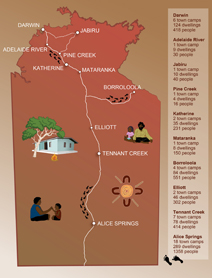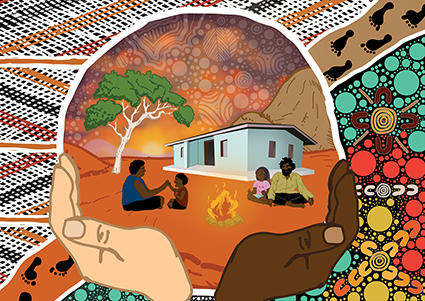About town camps
There are a total of 43 town camps situated within Northern Territory (NT) towns including:
- Darwin
- Katherine
- Alice Springs
- Tennant Creek
- Elliott.
Town camps are an important part of their community and are highly valued by their residents and their families.
They continue to be visited by family and friends from connected remote Aboriginal communities.
View the location of our town camps.
Town Camps Futures Unit
In April 2016, the NT Government (NTG) commissioned a review into identified systemic issues and challenges associated with the housing, infrastructure, governance and administration support for the 43 town camp areas across the NT.
The Living on the edge review report includes key findings and recommendations which were supported or supported-in-principal.
In April 2018, the NTG approved the public release of the NTG’s initial response to the town camp review report PDF (9.9 MB) including 25.5 million to undertake urgent repairs and maintenance, and the establishment of the Town Camps Futures Unit. The Town Camps Futures Unit was established in August 2018, within the Department of Local Government, Housing and Community Development, and immediately commenced work to progress the development of a policy framework, assessment of the future investment requirements and undertake the most urgent housing and infrastructure repairs.
Our role
Key functions of the Town Camps Futures Unit are to:
- oversee the funding into town camps for housing and infrastructure services
- accountability and reporting
- support effective processes for engagement and consultation with the Aboriginal community controlled sector
- capability building of residents and Aboriginal controlled sector
- remain the central coordination point for a whole-of-government approach to town camps reform
- develop and introduce service standards.
What we are doing
The Town Camps Futures Unit has developed a 5-year plan for town camps which addresses all of the key elements identified in the independent review and key government strategic policy including local decision making arrangements.
The Building our communities, together town camps reform framework 2019-2024 PDF (6.8 MB)
In November 2018, a $100 million stimulus for the construction industry was announced. $20 million of this stimulus program was identified for additional works in top end town camps. This brings the total investment allocated to the town camps urgent repairs and maintenance program to $40.4 million.
Investment has been prioritised across the top end town camps due to the significant need. The investment has focused on immediate works to ensure the health, safety and security of the community and town camps residents.
Through this investment, roads have been upgraded, critical water infrastructure upgraded, community safety improved with new street lighting and fencing, and housing upgraded. This infrastructure program is stimulating the local economy and improving town camps and community living areas.
These works have been delivered through Aboriginal controlled organisations, local sub-contractors and wherever possible, local suppliers. This ensures that the infrastructure investment supports local employment and economic development.
To support better health and wellbeing outcomes, housing upgrades have been delivered in line with the 9 healthy living practices. Healthy living practices focus on improving the physical equipment necessary for healthy, hygienic living; for example, fixing leaking toilets and ensuring that houses have functioning hot water and appropriate food preparation and storage areas. This approach can lead to improvements in health and reduce the risk of disease. Read more about the 9 healthy living practices PDF (636.1 KB) from recently upgraded houses.
To strengthen the Aboriginal community housing sector, the Town Camps Futures Unit is working with organisations and communities to increase local decision-making and capacity. This includes assisting organisations to become registered Community Housing Providers and developing community-led action plans that identify community aspirations and opportunities.
The Building our communities, together town camps reform framework 2019-2024 – progress report 30 June 2021 PDF (3.6 MB) provides an overview of key achievements since the Town Camps Futures Unit was established in August 2018.
Snapshot of the work in town camps
Housing and infrastructure achievements of the program as at 30 June 2021 include:
- 306 projects completed
- $41.4 million invested in housing and infrastructure projects (GST exclusive)
- 5 primary contactors are Aboriginal controlled organisations
- 9 local sub-contractors are Aboriginal controlled organisations.
- Manabadurma town camp and the Jabiru masterplan PDF (130.9 KB)
- Kulaluk Minmarama Land Assessment Report PDF (4.6 MB)
View results and stories from the Town Camps infrastructure works program.
Who we are working with
To inform the 5-year plan for town camps and to roll-out the town camps infrastructure works program, the Town Camps Futures Unit engaged with town camp stakeholders including:
- residents
- the Aboriginal controlled housing sector
- key non-government sector peaks
- the Aboriginal Peak Organisations of the NT.
External advisory group
The Town Camps Futures Unit has established an external advisory group that provides advice to inform the development of the 5-year plan for town camps.
Members of the external advisory group are representatives from the Aboriginal Controlled Housing Organisations (ACHO) who are currently responsible for service provision areas of town camps and community living areas. These are:
- Yilli Rreung Housing Aboriginal Corporation - Darwin
- Pine Creek Aboriginal Advancement Association Inc. - Pine Creek
- Kalano Community Association - Katherine
- Mabunji Aboriginal Resource Association incorporated - Borroloola
- Julalikari Council Aboriginal Corporation - Tennant Creek
- Tangentyere Council and Central Australian Affordable Housing – Alice Springs
- Aboriginal Housing NT.
The role of the external advisory group is to:
- provide ideas on what supports and processes need to be considered for town camps and community living areas for the future
- provide their views on what role they see their organisation playing in the town camps and community living areas space in the future
- test policy ideas, workshop a range of different scenarios and provide feedback directly to the Town Camps Futures Unit.
Inter-agency working group
We have also established an inter-agency working group to guide and inform the development of the 5-year plan for town camps and the reform implementation approach. Key agencies represented are:
- Department of Territory Families, Housing and Communities
- Department of the Chief Minister and Cabinet
- Department of Infrastructure, Planning and Logistics
- Department of Industry, Tourism and Trade.
The artwork
This artwork originated following a workshop between Aboriginal Interpreter Service and Town Camps Futures staff.
The elements in this artwork represent some of the things that town camps mean to Aboriginal people: culture, family, land, life and working together.
Hands: hands symbolise the unity between people from various Aboriginal nations who co-exist and live together in our town camps. They also represent people working together and helping one another.
Dot art: this represents the Aboriginal nations of the Central Australian region.
Line art: this represents the Aboriginal nations of the Top End region.
Tree: the tree represents the Aboriginal kinship system and how Aboriginal people relate to each other through kin, skin groups, adoption and marriage; the “family tree”.
Children: children represent the future of Aboriginal nations and the next care takers of land, song lines, culture, art, beliefs, language and population growth.
Camp fire: the camp fire symbolises life; cooking food, back-burning, story-telling and coming together for warmth.
Foot prints: the foot prints symbolises mobility and Aboriginal ancestors who have been walking this land for thousands of years. They also represent how Aboriginal people will continue walk this land and will be here for generations to come.
Contact
For more information, email RemoteHousingReform.TFHC@nt.gov.au.
Give feedback about this page.
Share this page:
URL copied!

